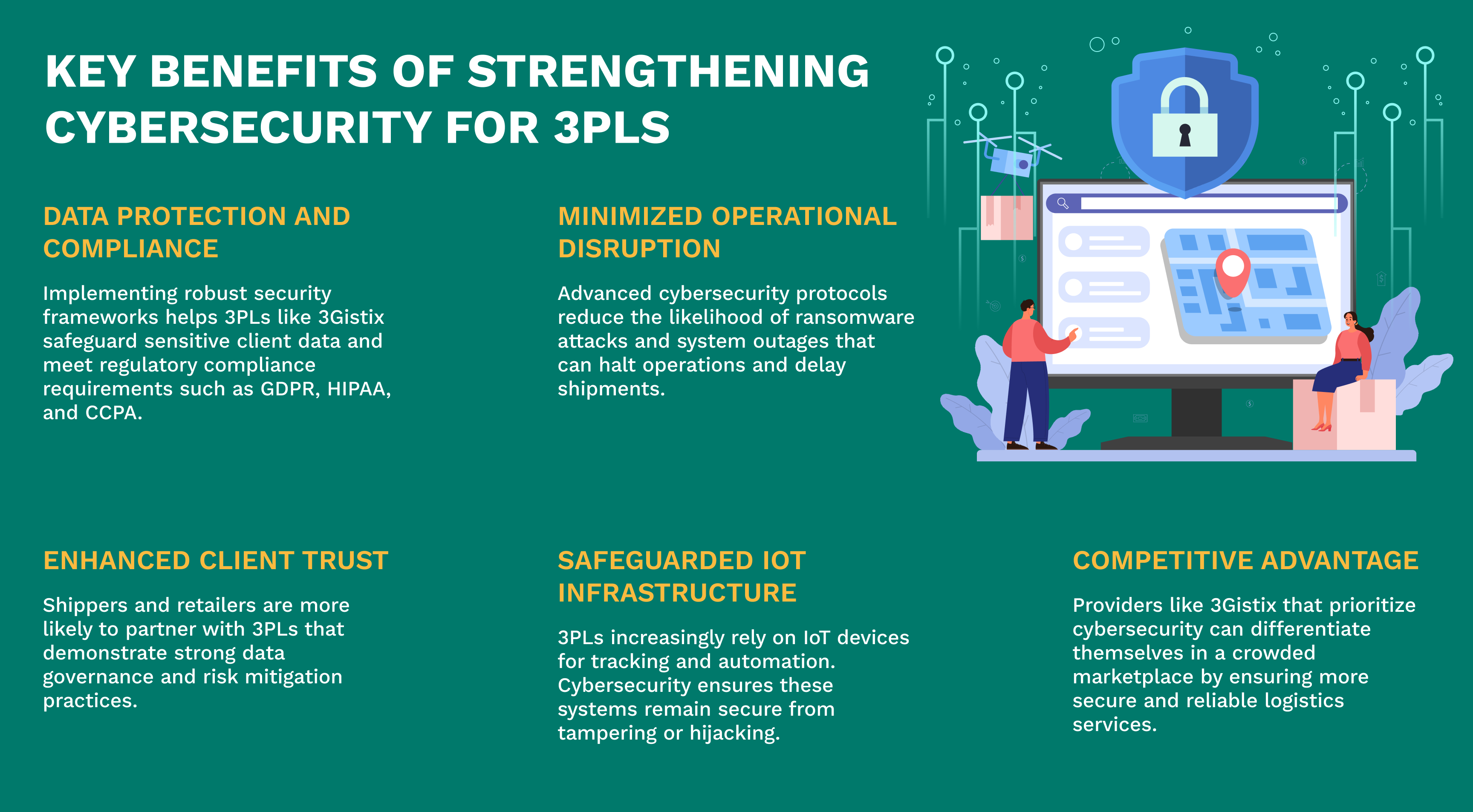In today’s digital-first supply chain, cybersecurity is no longer optional—it’s mission-critical. With cyberattacks on the rise and data breaches becoming increasingly costly, third-party logistics (3PL) providers are now prime targets for cybercriminals. From warehouse management systems to transportation data, 3PL companies hold massive volumes of sensitive information that must be protected.
For forward-thinking providers like 3Gistix, cybersecurity is a top strategic priority—not only to protect internal operations but to build trust with clients relying on their services.
Why Cybersecurity Is Crucial for 3PL Providers
Modern 3PLs operate in a hyper-connected environment, integrating with clients, suppliers, carriers, and e-commerce platforms. This interconnectedness creates more vulnerable entry points for cyberattacks such as ransomware, phishing, and supply chain infiltration.
Key areas at risk include:
- Warehouse and transportation management systems (WMS/TMS)
- Inventory and order processing platforms
- IoT-enabled tracking devices
- Customer and vendor databases
- APIs and EDI integrations

Industry Analytics and Statistics
According to IBM’s 2024 Cost of a Data Breach Report, the average cost of a breach in the transportation sector is $4.96 million.
Cybersecurity Ventures forecasts that global cybercrime damages will reach $10.5 trillion annually by 2025.
A 2023 report by Fortinet found that 93% of logistics organizations experienced at least one cyber incident in the past year.
In a recent internal audit, 3Gistix revealed a 38% improvement in threat detection and a 50% reduction in system downtime after implementing AI-based cybersecurity tools.


Key Benefits of Strengthening Cybersecurity for 3PLs
Data Protection and Compliance
Implementing robust security frameworks helps 3PLs like 3Gistix safeguard sensitive client data and meet regulatory compliance requirements such as GDPR, HIPAA, and CCPA.
Minimized Operational Disruption
Advanced cybersecurity protocols reduce the likelihood of ransomware attacks and system outages that can halt operations and delay shipments.

Enhanced Client Trust
Shippers and retailers are more likely to partner with 3PLs that demonstrate strong data governance and risk mitigation practices.

Safeguarded IoT Infrastructure
3PLs increasingly rely on IoT devices for tracking and automation. Cybersecurity ensures these systems remain secure from tampering or hijacking.

Competitive Advantage
Providers like 3Gistix that prioritize cybersecurity can differentiate themselves in a crowded marketplace by ensuring more secure and reliable logistics services.
How 3Gistix Leads in Logistics Cybersecurity
3Gistix has adopted a multi-layered cybersecurity strategy that includes:
- AI-powered threat monitoring and endpoint detection systems
- Zero Trust Architecture to limit access and enhance verification
- Encryption of all data in transit and at rest
- Regular employee training to combat phishing and social engineering
- Incident response planning and third-party audits
These proactive measures ensure that 3Gistix not only defends against cyber threats but also assures clients of uninterrupted service and data protection.
Conclusion
In a world where logistics operations rely on digital networks and real-time data, cybersecurity has become the backbone of trust and resilience. As cyber threats grow more sophisticated, third-party logistics providers must evolve from being reactive to proactively securing their digital infrastructure.
By investing in strong cybersecurity practices, 3Gistix demonstrates that safeguarding client data, operations, and reputation isn’t just a responsibility—it’s a core value. For shippers seeking a reliable logistics partner in 2025, choosing a 3PL with proven cybersecurity measures is more important than ever.



